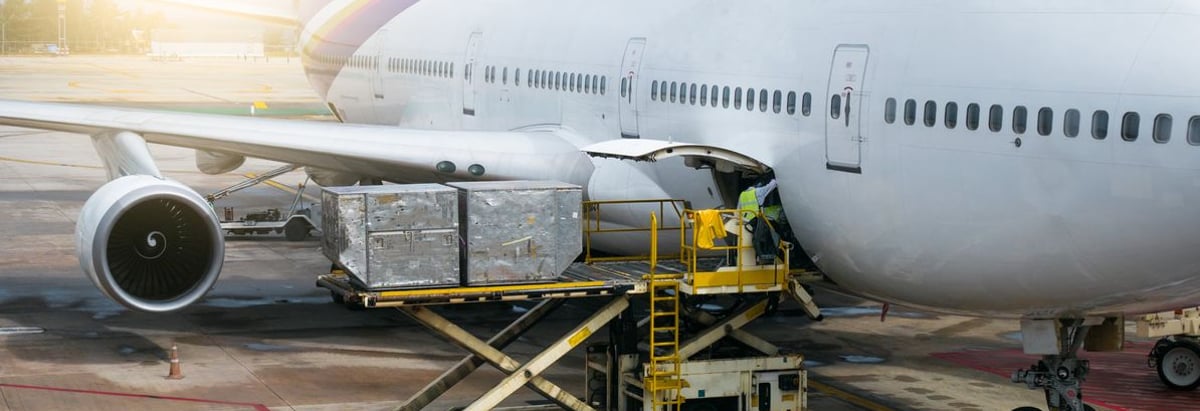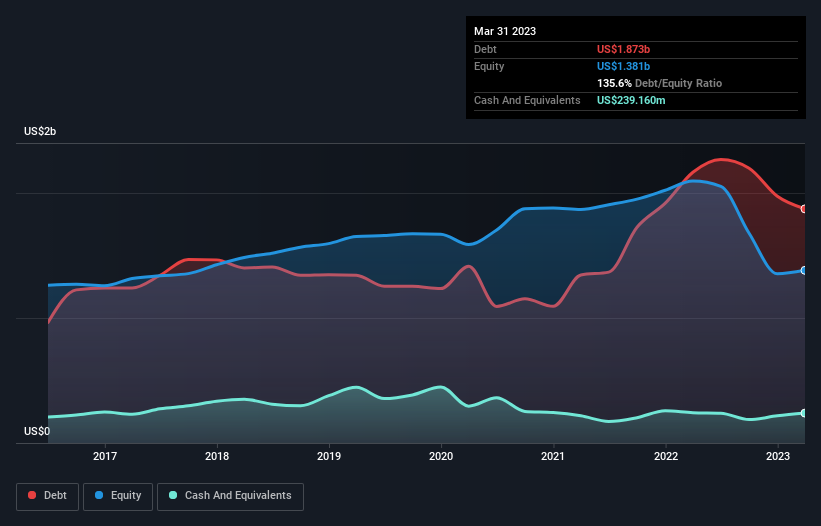- United States
- /
- Logistics
- /
- NasdaqGS:CHRW
Here's Why C.H. Robinson Worldwide (NASDAQ:CHRW) Can Manage Its Debt Responsibly

David Iben put it well when he said, 'Volatility is not a risk we care about. What we care about is avoiding the permanent loss of capital.' It's only natural to consider a company's balance sheet when you examine how risky it is, since debt is often involved when a business collapses. We can see that C.H. Robinson Worldwide, Inc. (NASDAQ:CHRW) does use debt in its business. But the real question is whether this debt is making the company risky.
Why Does Debt Bring Risk?
Debt and other liabilities become risky for a business when it cannot easily fulfill those obligations, either with free cash flow or by raising capital at an attractive price. If things get really bad, the lenders can take control of the business. However, a more frequent (but still costly) occurrence is where a company must issue shares at bargain-basement prices, permanently diluting shareholders, just to shore up its balance sheet. Of course, the upside of debt is that it often represents cheap capital, especially when it replaces dilution in a company with the ability to reinvest at high rates of return. The first step when considering a company's debt levels is to consider its cash and debt together.
View our latest analysis for C.H. Robinson Worldwide
What Is C.H. Robinson Worldwide's Net Debt?
You can click the graphic below for the historical numbers, but it shows that C.H. Robinson Worldwide had US$1.87b of debt in March 2023, down from US$2.17b, one year before. However, it also had US$239.2m in cash, and so its net debt is US$1.63b.

A Look At C.H. Robinson Worldwide's Liabilities
Zooming in on the latest balance sheet data, we can see that C.H. Robinson Worldwide had liabilities of US$2.95b due within 12 months and liabilities of US$1.27b due beyond that. Offsetting these obligations, it had cash of US$239.2m as well as receivables valued at US$2.87b due within 12 months. So it has liabilities totalling US$1.10b more than its cash and near-term receivables, combined.
Since publicly traded C.H. Robinson Worldwide shares are worth a very impressive total of US$11.4b, it seems unlikely that this level of liabilities would be a major threat. Having said that, it's clear that we should continue to monitor its balance sheet, lest it change for the worse.
In order to size up a company's debt relative to its earnings, we calculate its net debt divided by its earnings before interest, tax, depreciation, and amortization (EBITDA) and its earnings before interest and tax (EBIT) divided by its interest expense (its interest cover). The advantage of this approach is that we take into account both the absolute quantum of debt (with net debt to EBITDA) and the actual interest expenses associated with that debt (with its interest cover ratio).
C.H. Robinson Worldwide's net debt is only 1.4 times its EBITDA. And its EBIT easily covers its interest expense, being 13.6 times the size. So we're pretty relaxed about its super-conservative use of debt. But the other side of the story is that C.H. Robinson Worldwide saw its EBIT decline by 6.8% over the last year. That sort of decline, if sustained, will obviously make debt harder to handle. The balance sheet is clearly the area to focus on when you are analysing debt. But ultimately the future profitability of the business will decide if C.H. Robinson Worldwide can strengthen its balance sheet over time. So if you want to see what the professionals think, you might find this free report on analyst profit forecasts to be interesting.
But our final consideration is also important, because a company cannot pay debt with paper profits; it needs cold hard cash. So we clearly need to look at whether that EBIT is leading to corresponding free cash flow. During the last three years, C.H. Robinson Worldwide produced sturdy free cash flow equating to 70% of its EBIT, about what we'd expect. This cold hard cash means it can reduce its debt when it wants to.
Our View
Happily, C.H. Robinson Worldwide's impressive interest cover implies it has the upper hand on its debt. But truth be told we feel its EBIT growth rate does undermine this impression a bit. Looking at all the aforementioned factors together, it strikes us that C.H. Robinson Worldwide can handle its debt fairly comfortably. Of course, while this leverage can enhance returns on equity, it does bring more risk, so it's worth keeping an eye on this one. When analysing debt levels, the balance sheet is the obvious place to start. However, not all investment risk resides within the balance sheet - far from it. For instance, we've identified 2 warning signs for C.H. Robinson Worldwide that you should be aware of.
Of course, if you're the type of investor who prefers buying stocks without the burden of debt, then don't hesitate to discover our exclusive list of net cash growth stocks, today.
New: AI Stock Screener & Alerts
Our new AI Stock Screener scans the market every day to uncover opportunities.
• Dividend Powerhouses (3%+ Yield)
• Undervalued Small Caps with Insider Buying
• High growth Tech and AI Companies
Or build your own from over 50 metrics.
Have feedback on this article? Concerned about the content? Get in touch with us directly. Alternatively, email editorial-team (at) simplywallst.com.
This article by Simply Wall St is general in nature. We provide commentary based on historical data and analyst forecasts only using an unbiased methodology and our articles are not intended to be financial advice. It does not constitute a recommendation to buy or sell any stock, and does not take account of your objectives, or your financial situation. We aim to bring you long-term focused analysis driven by fundamental data. Note that our analysis may not factor in the latest price-sensitive company announcements or qualitative material. Simply Wall St has no position in any stocks mentioned.
About NasdaqGS:CHRW
C.H. Robinson Worldwide
Provides freight transportation and related logistics and supply chain services in the United States and internationally.
Solid track record with excellent balance sheet and pays a dividend.
Market Insights
Community Narratives



